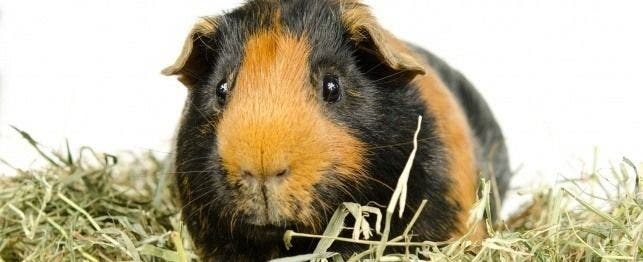
Keeping Your Guinea Pig Healthy
A healthy guinea pig’s eyes are bright and clear with no sign of cloudiness. His nose should also be clear and his hair shiny and clean, even under his rump. His body should be plump but not obese. Healthy guinea pigs are timid by nature but respond well to a firm human touch. As long as you hold your guinea pig properly – close to your body, with one hand underneath supporting his body weight and the other securing his back – he should seem calm and friendly.
Your guinea pig’s sense of smell is several times better than your own so he will soon come to recognize your scent. The more time you spend with your guinea pig the better: Well-handled babies (called “puppies” or “pups”) can become exceptionally tame adults. If you handle your guinea pig every day you are more likely to notice any early signs of health problems. You will notice if your guinea pig becomes listless or loses his appetite – the two most common signs of illness.
Keeping your guinea pig happy and healthy is relatively simple. It’s always better to take preventative steps rather than to face illness, veterinary expenses, and even death. If you carefully follow these recommendations, your guinea pig is likely to have a long and healthy life.
Five Things To Do
- Be sure your guinea pig always has fresh water. Wild guinea pigs are the little camels of South America – it seems like they never need to drink freestanding water. Their trick is that they eat cactus and other succulents to get their fluids. Domestic guinea pigs don’t usually get these wet greens, so they should have a full water bottle available to them at all times.
- Give your guinea pig an outside source of vitamin C. Like humans and Indian fruit bats, guinea pigs do not synthesize their own vitamin C. Fresh fruits and vegetables, like kale, citrus fruits and cabbage, all contain high levels of this vitamin. You can feed your guinea pig one quarter of an orange with the peel still on it every day. Be sure to remove fresh food leftovers at the end of each day. The mold that grows on discarded food remnants can be harmful and even toxic to your guinea pig.
Alfalfa pellets that are specially formulated for guinea pigs provide the missing vitamin, but owners should be wary that the supplement loses its potency as the pellets age. If the food has been on the shelf for more than 30 days, it has probably lost its punch.
- Control the temperature in and around your guinea pig’s cage. Guinea pigs are intolerant of temperature extremes. They are happiest when their cages are dry, well ventilated, and kept at stable temperatures between 60 and 80 degrees Fahrenheit. Your guinea pig will suffer heat exhaustion or heat stroke if it is too hot, so you must never leave the cage in direct sunlight or next to a radiator.
- Make sure your guinea pig has room to exercise. Guinea pigs aren’t good climbers, but they do like to explore and hide in new places. They like to burrow through their bedding and crawl through cardboard boxes or tubes. A tree branch on the cage floor can serve as a plaything and a chew toy that the guinea pig can use to wear down his continuously growing teeth.
- Keep your guinea pig’s life stress-free. As much as possible, they need to have a stable environment. Any big changes – from an owner switch, to a new cage-mate, to a change in basic diet – can disrupt your inflexible pet. At these stressful moments guinea pigs are most vulnerable to illness. If it seems like one of your guinea pigs is sick, isolate him from the rest of your animals and get help immediately.
Once a year, take your guinea pig to the veterinarian for a full check-up. The vet can make sure that your guinea pig’s toenails are the right length and his teeth are healthy. She can also weigh your guinea pig and answer any further questions you might have about his health.